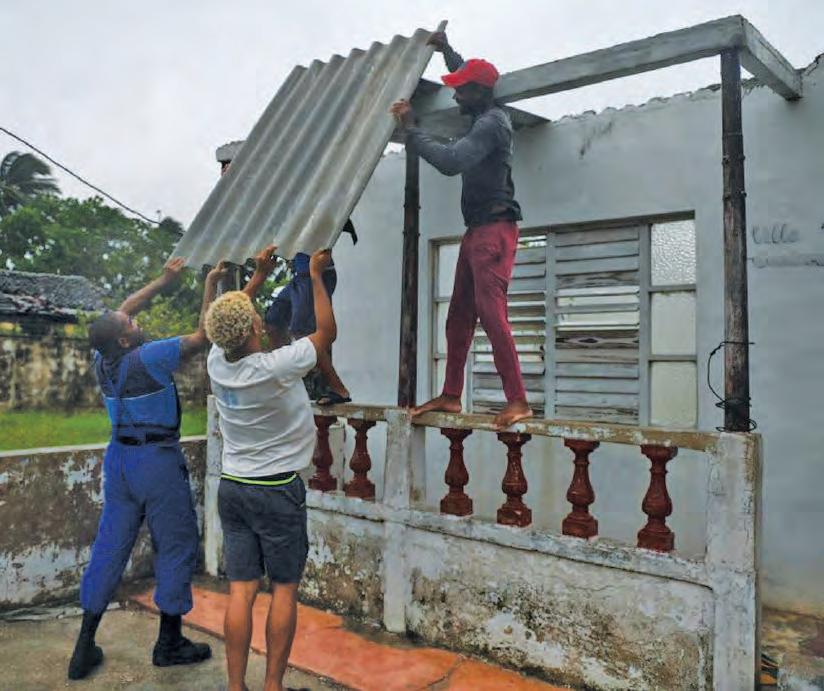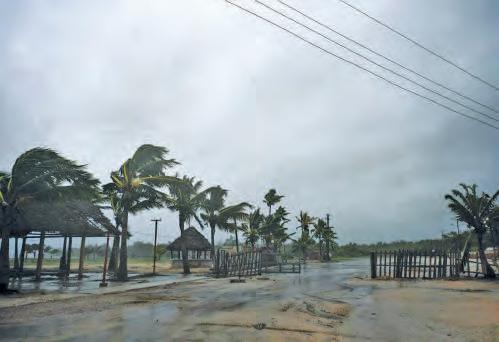
5 minute read
Will tackling climate change put an end to devastation in the Caribbean?
TIME TO SAVE THE WORLD


SOMETHING HAS TO CHANGE: Hurricane Ida swept through eastern Cuba in August – but will tackling climate change mean the Caribbean’s hurricane seasons will be less devastating?
ALTHOUGH THE Caribbean as a region is among the lowest emitters of greenhouse gases in the world (accounting for less than one per cent of global emissions), it stands to suffer some of the worst effects of climate change as time goes on.
From October 31 to November 12, 2021, the UK will host the 26th United Nations Climate Change Conference, known as the 26th Conference of the Parties (COP26) in Glasgow, Scotland.
This summit will be attended by all the countries that signed the 1994 treaty on the United Nations Framework Convention on Climate Change (UNFCCC).
It is set to be the largest summit the UK has ever hosted, with many seeing it as the most important climate event since the 2015 Paris Agreement when all signatories agreed to keep global temperatures below two degrees above pre-industrial levels and limit global temperature increases to 1.5 degrees.
This comes against a backdrop of increased extreme weather events across the world; the loss of an area of ice the size of Florida in the Artic in June/ July 2021, widespread forest fires in the Amazon and Congo rainforests in 2020, extreme heatwaves across north America and southern Europe and record-breaking wildfires across Siberia covering an area almost twice the size of Portugal, demonstrating the increasing threat of climate change.
COP26 is significant in part because countries must set out even more ambitious targets for ending their contribution to climate change under the Paris Agreement.
However, there are significant questions about how much can and will be achieved when considering the interests of developing countries and regions such as the Caribbean, which have been in a climate crisis for many decades before this point.
Lingering issues Most scientists now agree that some effects due to climate change are locked-in and cannot be reversed until we have achieved net zero emissions for many decades.
As a result, some form of climate mitigation and adaptation measures are needed, particularly in regions such as the Caribbean.
Calls by the Alliance of Small Island States (AOSIS), which most Caribbean countries are members of, along with a coalition of climate and environmental groups are demanding rich industrialised countries put forward an estimated £36.5 billion by 2022 and then £220 billion annually by 2030 to account for inevitable losses and damages that result from climate change.
While the UN has provided funds to help poorer countries transition to cleaner energy, rich industrialised countries which hold much of the responsibility for climate change have stalled on providing new finance to cover losses and damages in the global south, arguing instead for the establishment of insurance schemes.
This has been an intractable issue at previous COP events and a source of tension between poor countries and rich countries.
Global leaders have to ensure the COP26 summit in Glasgow is the most important climate event of all time By Lyndon Mukasa
The threat of the climate crisis in the Caribbean In the Caribbean, 2020 was among the three warmest years on record that saw 30 named storms detected in the Atlantic basin which broke the record for the highest number of tropical and subtropical storms in a single year.
At present, the Earth’s average temperature is at 1.1 degrees above pre-industrial levels.
However, the latest Intergovernmental Panel on Climate Change (IPCC) claims in its most recent report that the world will probably reach or exceed 1.5 degrees of global warming within two decades unless drastic action is taken this decade.
For many countries in the Caribbean as well as other small island developing states (SIDs), limiting increases to 1.5 degrees would be unacceptable since many scientists argue that 1.5 degrees still increases extreme climate outcomes such as extreme rainfall and more powerful hurricanes, thus putting in to question what can be achieved at COP26 that would make a difference to the Caribbean. Problems with COP26 Assistant professor in Global Sustainable Development at the University of Warwick, Dr Leon Sealy-Huggins, argues that a significant portion of climate change politics still functions to represent the interests of a subsection of the global elite that frames climate targets and priorities according to Western needs and interests.
Dr Sealy-Huggins posits that this is evident in the fact that a single average temperature target such as 1.5 degrees being defined as “dangerous” is an example of technocratic universalism and fails to account for lower temperatures above pre-industrial levels that have already wreaked havoc in the Caribbean.
This is evident in the fact that the most extreme manifestations of climate change have been occurring in the global south, including the Caribbean, already for many decades without a significant global response.
Dr Sealy-Huggins contends there is a need to look at the role that targets based diplomacy in the UNFCCC centres on Western development norms that favours the interests of industrialised former colonial powers at the expense of policymakers in the Caribbean who already have specific concerns relating to the climate crisis.
What can the Caribbean do? Despite these issues, much of the Caribbean has been moving forward with climate mitigation and adaptation measures. It is expected that a resolution on losses and damages will be made at COP26.
Despite this, most countries in the region are in the process of transitioning to renewable energy this decade and have set ambitious targets to achieve complete zero carbon energy independence before the end of the 2030s.
The Caribbean has an overabundance of renewable energy options that is starting to be explored and developed.
The region is widely considered to be one of the best parts of the world for the development of solar, wind, bio, geothermal, tidal and hydroelectric energy.
Additionally, climate-adaptive measures such as reinforced infrastructure for flooding are in the early stages of implementation.
Regardless of what COP26 achieves, the Caribbean will have to find ways to adapt and survive.


